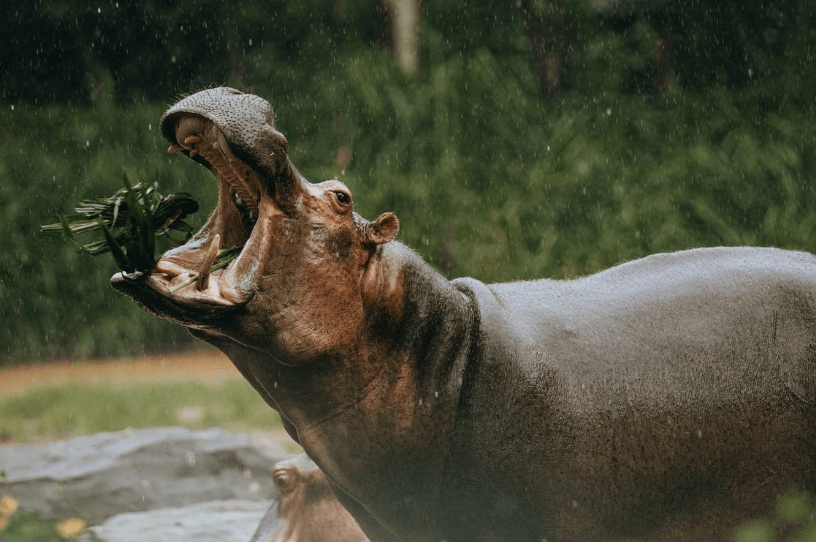When we think about hippos, we think of them as huge mammals with sharp tusks, but little did people know that they mainly eat plants. We mean, they may be massive and they can potentially attack people and other animals, but at least they are not carnivores or predators.
Or that is what we know. In reality, some studies suggest that hippos show carnivorous acts. If you want to learn more about this mysterious topic, then make sure to scroll further.
Facts to know about hippos
Hippopotamuses, also known as hippos, are large, water-loving mammals native to Africa. They are rotund animals and known to be the third largest living land mammals according to Animal Planet. A male hippo weighs from 1,600 to 4,500 kilograms, while a female weighs around 1,400 kilograms.
They love spending most of their time around abundant water, submerging themselves to keep themselves moist and cool. As amphibious animals, they spend up to 16 hours daily in the waters.
Hippos are also social beasts. They hang out and migrate in groups called bloats, schools, pods, or sieges. A school of hippos mainly consist of around 10 to 30 members, including both genders. Some groups may expand up to 200 individuals. A school is normally led by a dominant male.
They are loud, dangerous, and aggressive animals. They have sharp, large tusks and teeth that they use in fighting threats, humans included. Though they spend most of the time on water, hippos cannot really swim. They just glide themselves through the water.
Hippos mostly have an herbivorous appetite. An adult hippo can eat 35 kg of grass each day and travel up to 10 kilometers just to satisfy themselves. According to National Geographic, they also eat fruits. And if food sources are scarce, they can live up to three weeks without foraging.
For the longest time, hippos were believed to be exclusively herbivorous, a journal from the Mammal Review concluded that hippos can be carnivorous and even feed on carcasses of animals, including that of hippos.
Can hippos be carnivores?
The short answer is no—hippos cannot be exclusively and entirely carnivores but they could be omnivores when their main food source is scarce. Plants will remain as the major components of their diet, and their digestive systems have been developed to receive and handle it well.
There are a lot of people who think hippos are carnivores due to their massive size. But the truth is, they are mainly vegetarians. You see, the terms “omnivorous,” “carnivorous,” and “herbivorous” are just to be seen as general guidelines, not obligatory rules for what animals, including humans, actually eat.
For hippos, they exhibit a rather weird behavior of not being obligatory herbivores. They are seen to switch food sources from plants to meat, even carcasses as desperate measures, but their anatomy and behavior are far more different from those of a usual bear, owl, or pig.
When they eat carcasses, they feed on the dead bodies of those that have been killed, attacked, and eaten by other animals, such as Wildebeest, Impala, and other hippos. This instance is rare—hippos only have to resort to such an act if food is scarce.
Other facts about baby hippos
Female hippos can only have one baby at a time, with a gestation period of eight months. When the calf is birthed, it weighs around 23 to 50 kilograms. And for eight months, the mother will take care of her calf, nursing it on land and even underwater. When a calf goes underwater, it has the ability to close its nose and ears to block the water from passing through. The calf reaches full maturity at 5 to 7 years old.
Hippos: safe or dangerous to humans?
Hippos may be adorably fearsome, but they belong to the world’s deadliest land mammal. These semi aquatic mammals kill approximately 500 people yearly in Africa, according to BBC. They are aggressive mammals and equipped to exhibit damage to whatever attempts to enter their territories.
For instance, a hippo once attacked a boat filled with 12 children and one teacher, killing them all. Conflicts may arise when humans and hippos come across each other may it be on land or water.
Therefore, the next time you see a hippo, do not be tempted to get close to it. Because the next thing you know, you are already fighting for your life.
Conservation status
The International Union for Conservation of Nature (IUCN) states that the common hippo is vulnerable to extinction. They state that there are between 125,000 to 148,000 hippos remaining in the world. Habitat loss and poaching are the main reasons as to why the hippo’s global population depreciated during the late 1990s to early 2000s. But since there are more strict regulations, the decrease has plateaued.

